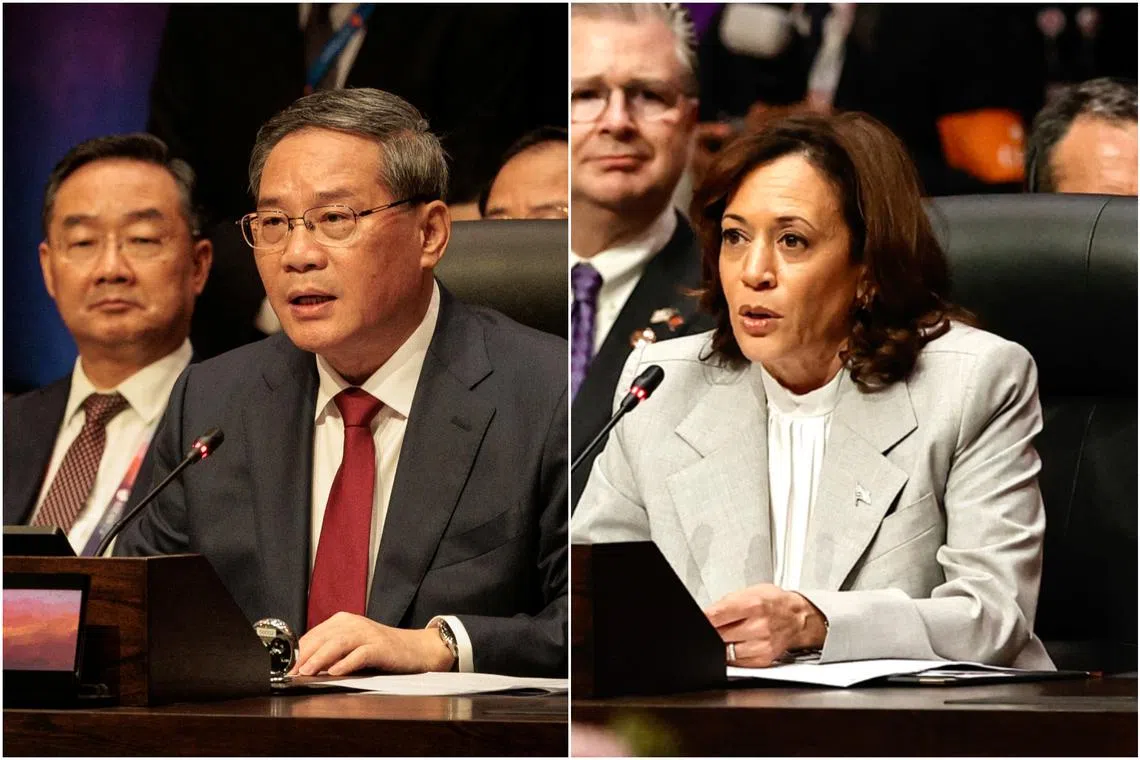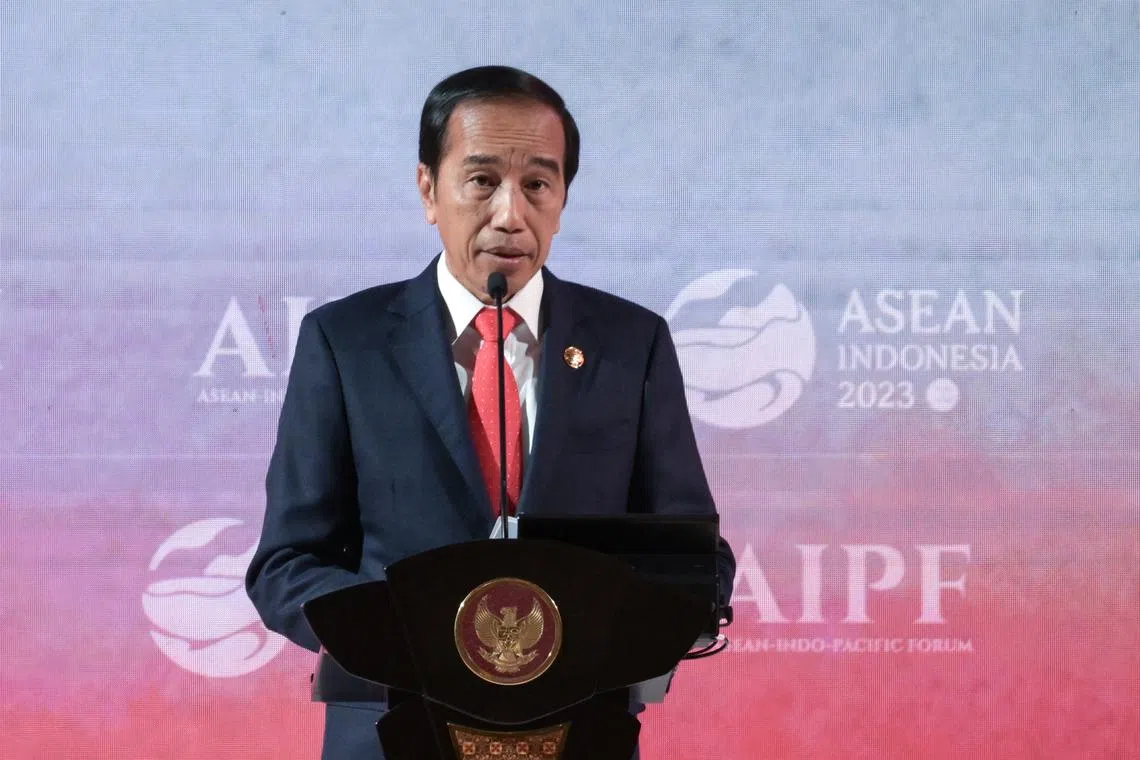China’s premier urges Asean to oppose new Cold War, US V-P pledges enduring commitment to region
Sign up now: Get insights on Asia's fast-moving developments

China's Premier Li Qiang (left) and US V-P Kamala Harris delivering remarks at the Asean-US Summit in Jakarta, on Sept 6.
PHOTO: REUTERS, EPA-EFE
JAKARTA – Chinese Premier Li Qiang on Wednesday rode on Indonesia’s first high-speed railway that was financed by a loan from Beijing, after earlier commending how Asean and China had maintained open markets for mutual benefit and cooperation.
The US$7.3 billion (S$9.9 billion) railway is one of China’s Belt and Road Initiative (BRI) projects. Following delays due to various factors including the Covid-19 pandemic, the 142km railway connecting Jakarta to the city of Bandung is now scheduled to commence operations on Oct 1.
At the Asean-China Summit earlier, Mr Li hailed the new opportunities created for both sides through “a steady stream” of BRI projects, and the “solid progress” in building the New International Land-Sea Trade Corridor, a major trade and logistics passage established jointly by China and Asean.
He also noted that China and Asean have been each other’s top trading partners in the past three years, with the two-way trade volume reaching over US$970 billion in 2022, double from a decade ago.
“China and Asean see each other’s development as important opportunities, and we have kept markets open to each other,” he said.
Indonesian President Joko Widodo had opened the Asean-China Summit,
He also lauded its accession to Asean’s Treaty of Amity and Cooperation in South-east Asia (TAC) 20 years ago. The TAC governs interstate relations in the South-east Asia region and beyond.
On top of such mutually beneficial cooperation, trust needs to be built and maintained by all parties, Mr Widodo stressed.
“One of (the ways to ensure trust) is by respecting international law. Trust and concrete cooperation can be a positive force for stability and regional peace,” he said, without mentioning any particular issue.
The joint summit gave Asean leaders the opportunity to discuss speeding up negotiations on the code of conduct to govern the waters of the South China Sea with China. Overlapping territorial claims in the waterway by China, Taiwan and four Asean states – Brunei, Malaysia, the Philippines and Vietnam – continue to pose challenges for the regional bloc.
A new Chinese map issued recently claiming sovereignty over a larger area has irked several Asean nations.
Making his address after Mr Widodo’s, the Chinese Premier stressed that China and Asean have maintained close exchanges and communication, respected each other’s development path and accommodated each other’s major concerns “no matter how the international situation evolves”.

Indonesian President Joko Widodo had opened the Asean-China Summit, acknowledging China’s role as Asean’s comprehensive strategic partner.
PHOTO: EPA-EFE
“We both have a relentless pursuit of peace, we both have a strong aspiration for development. We both take real actions to preserve regional stability,” Mr Li said through an interpreter.
“As long as we keep to the right path, no matter what storm may come, China-Asean cooperation will be as firm as ever, and press ahead against all odds. And we each will achieve greater development and progress in the course of such cooperation,” he added.
Later, at the Asean Plus Three Summit attended by Asean members as well as China, Japan and South Korea, Mr Li said disagreements and disputes may arise between countries due to misperceptions, diverging interests or external interferences.
He reminded leaders to keep differences in check, adding in a thinly veiled reference to the United States: “It is important now to oppose taking sides, bloc confrontation and a new Cold War.”
China has strongly criticised any formation of US-backed blocs in the region, viewing them as attempts to contain its rise.
Asean leaders also held separate summits on Wednesday with the leaders of several big powers such as the US, Japan, South Korea and Canada.
At the Asean-US meeting, US Vice-President Kamala Harris said that the US has an “enduring commitment” to South-east Asia and, more broadly, the Indo-Pacific.
“The defence and deterrence commitments of the United States and our security presence in the Indo-Pacific help protect our homeland and ensure regional stability. It is therefore in our vital interests to promote a region that is open, interconnected, prosperous, secure and resilient,” she added.
Ms Harris said the US has a shared commitment to international rules and norms on such pressing national and regional issues as the crisis in Myanmar, where a military coup in 2021
The US will continue to support Asean’s five-point peace plan to deal with the crisis in Myanmar, she said, adding: “The United States will continue to press the regime to end the horrific violence, to release all those unjustly detained and to re-establish Myanmar’s path to inclusive democracy.”
The US has expanded ties with Asean during the term of President Joe Biden, investing in infrastructure and the digital economy, launching major initiatives to address the climate crisis and health security, and expanding cultural and educational exchange programmes, she said.
The first-ever US-Asean Centre will be established in Washington through a public-private partnership to facilitate official Asean engagements and further support exchanges between the people, businesses and academic institutions, she said.
Ms Harris urged leaders to invest in a long-term vision as they address present global challenges.
“We must look 10, 20, 30 years out, and measure our current steps against that vision. The United States and the nations of South-east Asia share many long-term interests and priorities, as well as a long-term vision.”


